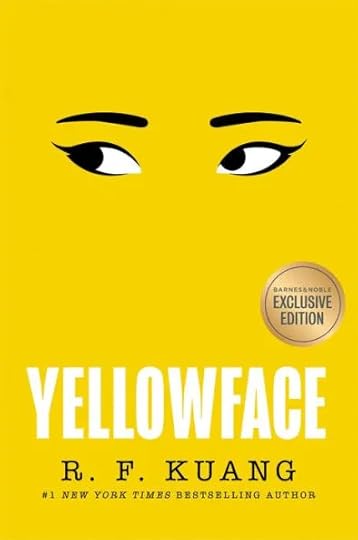A Review of R.F. Kuang’s Yellowface (William Morrow, 2023)
![[personal profile]](https://i.gr-assets.com/images/S/compressed.photo.goodreads.com/hostedimages/1491408111i/22407843.png) uttararangarajan
uttararangarajan

Written by Stephen Hong Sohn
Edited by Uttara Rangarajan
Ah, I knew when I saw the title of R.F Kuang’s latest novel I would have to read it. In Yellowface (William Morrow, 2023), Kuang explores the always thorny trope of writing from a cross-racial perspective. Let’s let the official marketing description give us some key background information: “Authors June Hayward and Athena Liu were supposed to be twin rising stars: same year at Yale, same debut year in publishing. But Athena’s a cross-genre literary darling, and June didn’t even get a paperback release. Nobody wants stories about basic white girls, June thinks. So when June witnesses Athena’s death in a freak accident, she acts on impulse: she steals Athena’s just-finished masterpiece, an experimental novel about the unsung contributions of Chinese laborers to the British and French war efforts during World War I. So what if June edits Athena’s novel and sends it to her agent as her own work? So what if she lets her new publisher rebrand her as Juniper Song—complete with an ambiguously ethnic author photo? Doesn’t this piece of history deserve to be told, whoever the teller? That’s what June claims, and the New York Times bestseller list seems to agree. But June can’t get away from Athena’s shadow, and emerging evidence threatens to bring June’s (stolen) success down around her. As June races to protect her secret, she discovers exactly how far she will go to keep what she thinks she deserves. With its totally immersive first-person voice, Yellowface takes on questions of diversity, racism, and cultural appropriation not only in the publishing industry but the persistent erasure of Asian-American voices and history by Western white society. R. F. Kuang’s novel is timely, razor-sharp, and eminently readable.” This work reads more like a novel of ideas related to our very complicated engagement now with identity politics and the reformation of the Western and the American canon. On the one hand, Kuang’s novel poses the issue that no single topic can be owned by a given group to represent. On the other, this particular main character is quite a complicated figure who tries to rationalize her decisions at every turn, and she is very hard to empathize with. For me, the biggest concern with this main character is her selective engagement and understanding of history. To be sure, she is aware of the importance of certain aspects of historical accuracy to the depictions that are being published. At the same time, June never fully engages with the longer history brought up in the very title. That is, as someone who is not of Asian descent, she seems frightfully unaware that the Asian cultures have so often been represented by non-Asians, whether in the realm of writing or otherwise. Kuang’s biggest critique of June seems to exist at this point, which is that June’s navel-gazing only goes so far. This novel is sure to bring up a lot of conversation and would be a perfect pairing with Elaine Hsieh Chou’s Disorientation. A dark satire to be sure and a solid effort from Kuang; it is a narrative which clearly reveals Kuang’s range and capacity as a writer (as she moves from the speculative terrains of her first four publications).
Buy the book Here
 comments
comments



